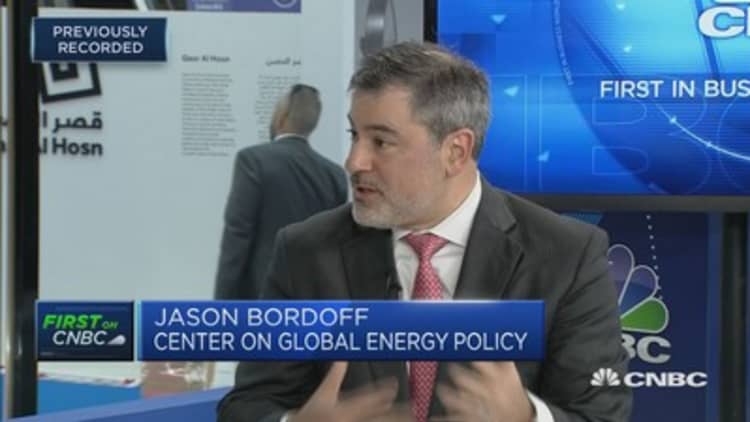U.S. shale oil production has shown some signs of moderation in recent months and production growth could be slowing, but experts told CNBC at Abu Dhabi's influential oil & gas summit that the U.S. shale revolution won't be stopped any time soon.
The U.S. is expected to become a net energy exporter in 2020, exporting more energy products ranging from oil to natural gas, than it imports, according to the U.S. Energy Information Administration (EIA).
Jason Bordoff, professor and director at Columbia University's Center on Global Energy Policy and a former adviser to President Obama, told CNBC Monday that he didn't think that status would be short-lived.
"I don't think the export story will be short-lived, I think the growth in production is going to slow but it's still growing, so we're still going to see the U.S. become a net oil exporter and put a lot of barrels on the market and that's really important," he told CNBC's Steve Sedgwick and Hadley Gamble at the Abu Dhabi International Petroleum Exhibition & Conference (ADIPEC) on Monday.

The U.S. Department of Energy's statistics bureau, the EIA, announced back in January that it expected the U.S. to become a net energy exporter in 2020 for the first time ever. It had been a net importer of energy since 1953, the EIA noted in its annual energy outlook which makes projections for the next 50 years.
The agency said the U.S. will start exporting more crude oil and petroleum products than it imports by the final quarter of 2020, and then would remain a net oil exporter for years to come. It noted, however, that production would increase per year until 2027 when it would then level off.
The net exporter status comes earlier-than-expected as a previous forecast believed it would be achieved by 2022.
Revolution to be continued?
Oil supply and demand dynamics are being closely watched amid efforts by major oil producers in OPEC, and non-OPEC producers led by Russia, to curb their oil output in a bid to stabilize prices.
Tellingly, U.S. shale producers have not been a part of the agreement to cut output to support prices which have hovered around the $60 per barrel mark; on Monday, benchmark Brent crude was trading at $61.97 per barrel and West Texas Intermediate (WTI) at $56.71.
The 14-member global oil producer group OPEC said in its closely-watched World Oil Outlook report released in early November that its own production of crude oil and other liquids is expected to decline over the next five years, falling to 32.8 million b/d (barrels a day) in 2024, from a current level of 35 million b/d in 2019.
The U.S. Energy Information Administration projected U.S. crude output will rise to 12.3 million b/d in 2019 from a record 11.0 million barrels per day in 2018. It forecasts that U.S. crude oil production will rise by 0.9 million b/d in 2020 to an annual average of 13.2 million b/d.
Yet there are signs of moderation too. Baker Hughes' closely-watched weekly Rig Count data, seen as an early indicator of future output, on Friday showed that there were 817 active rigs in the U.S. that week, down 264 from the same week in 2018.
Lorenzo Simonelli, chief executive of Baker Hughes, one of the world's largest oil field services firms, told CNBC Monday that a decline in capex (capital expenditure, essentially, investment within an industry) was being witnessed in the North American shale oil sector currently.
"We're seeing North America capex down in the fourth quarter as well as going in to next year so it's more challenging in North America than here in the Middle East," he said, agreeing that there was "definitely" less investment in shale at the moment.
"We're looking at high single digit to low double-digit declines in capex (capital expenditure) for our major customers in North America and that's going to be impacting shale," he said.

OPEC's Secretary-General Mohammad Barkindo remarked to CNBC last week that U.S. shale was facing challenges.
"We have already started seeing a deceleration of growth in the United States. The shale patch in the U.S. is facing a tremendous amount of headwinds as a result of the unprecedented growth that we have seen in the last couple of years," Barkindo said.
Asked if he agreed with Barkindo's assessment of the U.S. shale production outlook, Baker Hughes' Simonelli said "it's still early to say."
"U.S. production is still increasing, and even with the capex declines you've seen productivity and efficiency so a lot is going to be seen in 2020 with U.S. production, what's going to happen in the fourth quarter of 2020 in U.S. production," he said, referring to the quarter when net energy exporter status is expected to be reached.
Still a boon to investors
The U.S. shale industry is still attractive to companies like Mubadala, the investment arm of Abu Dhabi, and its Petroleum & Petrochemicals platform.
Mubadala Petroleum & Petrochemicals' CEO Musabbeh Al Kaabi told CNBC on Monday that the company had made a "substantial investment" in the U.S. petrochemical space and an LNG developer, and was still optimistic about the region.
"We're still very bullish about the U.S.," he told CNBC in Abu Dhabi. "By far, in the last ten years, it is a true disruption in our energy landscape so we have made a substantial investment, taking advantage of the opportunities offered by the shale revolution in the U.S."

He said the company's investments in the U.S. had been driven by the understanding that "the shale revolution will continue" but worried about anti-fracking comments from Democratic presidential nominee Elizabeth Warren, who said she would ban fracking "everywhere" if elected.
However, there are headwinds including what some of the Democratic nominees (in the U.S. election race) are promoting and I think the consequences of these decisions need to be evaluated and fully understood. It might be a very challenging decision to switch off the activity," he said.
Correction: This article has been updated to more accurately reflect Mubadala's portfolio.





